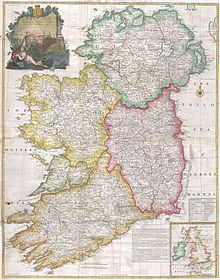Constitution of 1782
This article needs additional citations for verification. (May 2022) |


The Constitution of 1782 was a group of Acts passed by the Parliament of Ireland and the Parliament of Great Britain in 1782–83 which increased the legislative and judicial independence of the Kingdom of Ireland by reducing the ability of the Kingdom of Great Britain to make laws and hear court cases relating to Ireland. These changes were promoted, under the name legislative independence,[1] by the Irish Patriot Party, a loose alliance with Henry Grattan as its leading orator. The Parliament of Ireland as it existed after 1782 is often called Grattan's Parliament in his honour. The constitution did not create a responsible executive, as the Dublin Castle administration remained under the control of a Lord Lieutenant acting as a representative of the British government.
Under the terms of Poynings' Law of 1495, no law could be passed by the Parliament of Ireland that was not first approved by the Privy Council of England. In 1719, the Parliament of Great Britain passed the Declaratory Act which further restricted Irish legal independence by declaring that the British Parliament could directly pass laws in Ireland and that the British House of Lords was the highest court of appeal for Ireland.
These laws gave the Lord Lieutenant of Ireland, the representative in Ireland of the British government, control over the agenda of the Irish Parliament and authority to restrict its ability to legislate contrary to the objectives of the British government in London.
From 1782, Grattan – the leader of the Patriot Party – led a series of legal changes which produced a period of novel legislative freedom. The main act was the Repeal of Act for Securing Dependence of Ireland Act 1782.
The British Rockingham Ministry had conceded the act in fear of an American-style revolt. This concession was followed by the Irish Appeals Act 1783, commonly known as the Renunciation Act. By the terms of this act, the Parliament of Great Britain renounced all right to legislate for Ireland, and declared that no appeal from the decision of any court in Ireland could be heard in any court in Great Britain.
Grattan's Parliament also achieved greater control over the Royal Irish Army.
The new constitutional arrangements proved short-lived in consequence of the 1798 uprising by the United Irishmen. By the Acts of Union the Parliament of Ireland was abolished. The Kingdom of Ireland was absorbed into the new United Kingdom of Great Britain and Ireland, with effect from 1 January 1801.
See also
[edit]References
[edit]- ^ Connolly, S. J. (2007). "Legislative independence". The Oxford Companion to Irish History (2nd ed.). Oxford University Press. ISBN 9780191727429.

